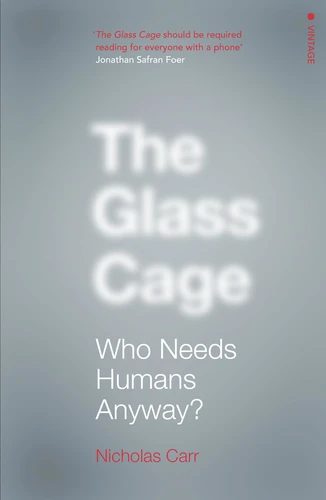The Glass Cage. Where Automation is Taking Us
Par :Formats :
Disponible dans votre compte client Decitre ou Furet du Nord dès validation de votre commande. Le format ePub protégé est :
- Compatible avec une lecture sur My Vivlio (smartphone, tablette, ordinateur)
- Compatible avec une lecture sur liseuses Vivlio
- Pour les liseuses autres que Vivlio, vous devez utiliser le logiciel Adobe Digital Edition. Non compatible avec la lecture sur les liseuses Kindle, Remarkable et Sony
- Non compatible avec un achat hors France métropolitaine
 , qui est-ce ?
, qui est-ce ?Notre partenaire de plateforme de lecture numérique où vous retrouverez l'ensemble de vos ebooks gratuitement
Pour en savoir plus sur nos ebooks, consultez notre aide en ligne ici
- Nombre de pages288
- FormatePub
- ISBN978-1-4735-1108-8
- EAN9781473511088
- Date de parution15/01/2015
- Protection num.Adobe DRM
- Infos supplémentairesepub
- ÉditeurVintage Digital
Résumé
In The Glass Cage, Pulitzer Prize nominee and bestselling author Nicholas Carr shows how the most important decisions of our lives are now being made by machines and the radical effect this is having on our ability to learn and solve problems. In May 2009 an Airbus A330 passenger jet equipped with the latest 'glass cockpit' controls plummeted 30, 000 feet into the Atlantic. The reason for the crash: the autopilot had routinely switched itself off.
In fact, automation is everywhere - from the thermostat in our homes and the GPS in our phones to the algorithms of High Frequency Trading and self-driving cars. We now use it to diagnose patients, educate children, evaluate criminal evidence and fight wars. But psychological studies show that we perform best when fully involved in a task, while the principle of automation - that humans are inefficient - is self-fulfilling.
The glass cockpit is becoming a glass cage. In this utterly engrossing exposé, bestselling writer Nicholas Carr reveals how automation is affecting our ability to solve problems, forge memories and acquire skills. Rather than rejecting technology, Carr argues that we must urgently rethink its role in our lives, using it to enhance rather than diminish the extraordinary abilities that make us human.
In fact, automation is everywhere - from the thermostat in our homes and the GPS in our phones to the algorithms of High Frequency Trading and self-driving cars. We now use it to diagnose patients, educate children, evaluate criminal evidence and fight wars. But psychological studies show that we perform best when fully involved in a task, while the principle of automation - that humans are inefficient - is self-fulfilling.
The glass cockpit is becoming a glass cage. In this utterly engrossing exposé, bestselling writer Nicholas Carr reveals how automation is affecting our ability to solve problems, forge memories and acquire skills. Rather than rejecting technology, Carr argues that we must urgently rethink its role in our lives, using it to enhance rather than diminish the extraordinary abilities that make us human.
In The Glass Cage, Pulitzer Prize nominee and bestselling author Nicholas Carr shows how the most important decisions of our lives are now being made by machines and the radical effect this is having on our ability to learn and solve problems. In May 2009 an Airbus A330 passenger jet equipped with the latest 'glass cockpit' controls plummeted 30, 000 feet into the Atlantic. The reason for the crash: the autopilot had routinely switched itself off.
In fact, automation is everywhere - from the thermostat in our homes and the GPS in our phones to the algorithms of High Frequency Trading and self-driving cars. We now use it to diagnose patients, educate children, evaluate criminal evidence and fight wars. But psychological studies show that we perform best when fully involved in a task, while the principle of automation - that humans are inefficient - is self-fulfilling.
The glass cockpit is becoming a glass cage. In this utterly engrossing exposé, bestselling writer Nicholas Carr reveals how automation is affecting our ability to solve problems, forge memories and acquire skills. Rather than rejecting technology, Carr argues that we must urgently rethink its role in our lives, using it to enhance rather than diminish the extraordinary abilities that make us human.
In fact, automation is everywhere - from the thermostat in our homes and the GPS in our phones to the algorithms of High Frequency Trading and self-driving cars. We now use it to diagnose patients, educate children, evaluate criminal evidence and fight wars. But psychological studies show that we perform best when fully involved in a task, while the principle of automation - that humans are inefficient - is self-fulfilling.
The glass cockpit is becoming a glass cage. In this utterly engrossing exposé, bestselling writer Nicholas Carr reveals how automation is affecting our ability to solve problems, forge memories and acquire skills. Rather than rejecting technology, Carr argues that we must urgently rethink its role in our lives, using it to enhance rather than diminish the extraordinary abilities that make us human.





